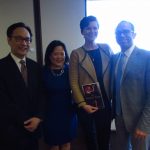On May 16 at Cleary Gottlieb, AABANY member Helen Wan was interviewed by Executive Director Yang Chen about her book The Partner Track, currently in its second printing since being published last September.
For someone who attained her childhood ambition of being a writer, Helen was extremely humble in describing the motivations for The Partner Track. As a former corporate lawyer herself, she drew from her own experiences as a natural introvert navigating relatively uncharted waters. Graduating law school and entering the corporate world, she found she was woefully overeducated and completely culturally unprepared. Since there was no BARBRI course on the unwritten set of rules, Helen sought some sort of book on how to be successful as a woman of color while still living authentically. Finding none, she decided to write one — writing on vacation time that didn’t roll over, it only took her 12 years.
Like Helen, her protagonist Ingrid is what Helen calls a “twofer” or a “Minority Darling,” someone who doubly occupies the minority gender and a minority race. The question of why a “model minority poster child” like Ingrid is even an outsider comes into play. Ingrid has attained such a high level of success without calling attention to her minority status; she has perfected the art of covering (the subject of Prof. Kenji Yoshino’s work), meaning that she has taken the assimilationist approach rather than the activist approach when it comes to her cultural identity. Ingrid passes, minimizing her ethnicity as much as possible, until an incident throws her other-ness into sharp relief. Reading a passage between Ingrid and “Diversity Expert” character Dr. Rossi (Dr. Rossi asked Ingrid why she wanted to be a lawyer and she recounts both an episode from her childhood and an episode from her first year at a law firm— no spoilers), Helen illuminated the need for decoder rings on how to survive because there are so many who can’t pass and can’t survive — not for lack of talent, but rather for an inability to adapt socially.
Helen received many rejections; the path to publication is quite risk-averse when the economy is bad. According to Helen, until we have adequate representation in media, which seems unlikely as we lack representation as the gatekeepers to media, we must vote with our feet as consumers and work to make our perspectives heard. The criticism for The Partner Track fell into two major camps: 1) Your story is too Chinese, or 2) Your story is not Chinese enough. Many publishers told her that they loved her story as a legal thriller, but that no one could identify with a protagonist like Ingrid. On the other side, other publishers told Helen that they loved that Ingrid was Chinese, but asked whether or not the story could be made more Chinese-y. There were no arranged marriages, no wedding banquets. Luckily, Helen stuck to her guns — eventually Helen found a publisher that understood the difference between Asian and Asian American, and no one in the story ended up in the Beijing office.
Even though Executive Director Yang Chen originally dismissed it as chick-lit, he found that The Partner Track struck a universal nerve because its purpose is to tell the story of what it means to be an outsider in an environment where it is extremely important to be in the inner circle. Indeed, Helen found from reader mail that her book had been extremely successful in this regard, among both attorneys and law students. In fact, a BALSA (Black and Latino Student Association) student wrote to her at the end of her time as a summer associate: “Thank you for telling our story. I wish I had known about the book from the beginning of the summer so then I wouldn’t have felt so alone.”
Now, Helen advises young associates of color to learn these unwritten rules of corporate culture early. According to Helen, diversity and inclusion budgets are being spent much better than they were 15 years ago, with targeted specific trainings for junior associates on how to get visibility, use performance reviews, and develop the skill sets needed to survive. Luckily, The Partner Track has become that guidebook to the unwritten rules that she and so many others desperately needed.
Thank you to Helen for creating such a thoughtful protagonist and sharing her experiences, thank you to Executive Yang Chen for leading the discussion, and thank you to Kenya Rodriguez and Carlos Davila-Caballero for putting together such a worthwhile and enjoyable event to celebrate APA Heritage Month.









